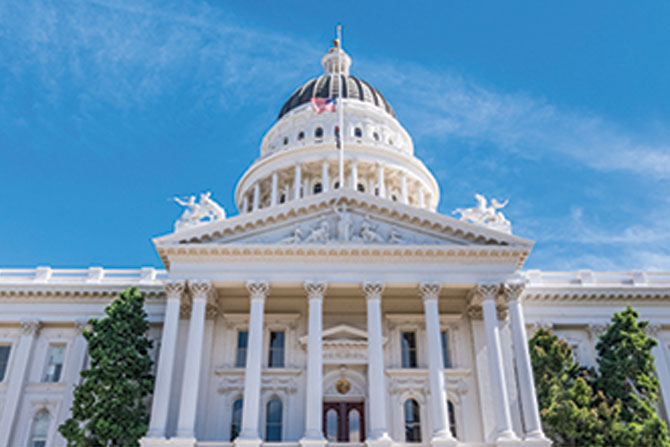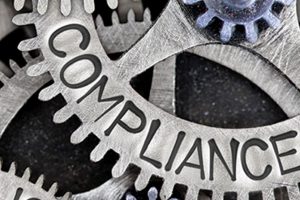By Alisa Reinhardt, Director of Government Affairs
Democrats in charge of both houses of the legislature delayed the start of this year’s legislative session by one week due to high statewide COVID-19 case numbers. As of mid-January, the members are back and Governor Newsom has begun lifting some of the more strict COVID-19 stay-at-home orders. Unlike prior years when the start of a new legislative session meant throngs of lobbyists and legislative staff descending on the Capitol, the Capitol is largely empty this year, as the building remains closed to the public and members are only allowed one essential staffer in the Capitol at a time. Both houses of the legislature have also put pandemic protocols in place that include mandatory temperature checks, masking, and social distancing, in addition to plexiglass installations at the Capitol’s entrance and extra cleaning. Email alerts to legislators and staff are sent almost daily at this point to inform them about yet another case of COVID-19 affecting the Capitol community.
Policy Priorities
During the last legislative session, in March 2020 when closures started being announced on a wide scale, legislators were directed to drop all bills that were unrelated to COVID-19. Some legislators followed that directive and some did not, which confused the legislature’s true policy priorities. This year, legislative leadership does not strictly limit the number of bills any given Assemblymember or Senator can carry. Members are being directed to keep legislation as limited as possible.
At least for the first half of this year, much of the state’s business will continue to be done via phone and video calls until the vaccine is rolled out more widely. Now that we are collectively entering a brand-new year but still facing the day-to-day realities of COVID-19, the legislature’s focus will remain primarily on measures related to combating the negative effects of the pandemic, including expanding employee leave policies, extending eviction moratoriums, attempting to address homelessness, overseeing reforms to the state Employment Development Department, and promoting equal access to technology related to education. We know that other top of mind issues for legislators include criminal justice reform and efforts to combat wildfires and rolling blackouts. Due largely to Governor Gavin Newsom’s recent Executive Order to ban sales of new internal combustion engine vehicles in the state by 2035, we are also likely to see bills related to that effort and combat climate change more generally.
CNCDA Sponsored Legislation
As of January 25th, early in the new 2021-22 legislative session, lawmakers have already introduced 588 bills — 253 of which we are watching, with many more measures to come. CNCDA is sponsoring one bill this year, aiming to modify the California Uniform Electronic Transactions Act (“CalUETA”) to remove the prohibition on electronic customer signatures on vehicle sales and lease agreements. While many attorneys believe that the federal Electronic Signatures in Global and National Commerce Act (“E-Sign Act”) preempts CalUETA, this is a gray area in the law and needs to be addressed so that dealers can operate their businesses with certainty. CNCDA has attempted to run this bill in the past. Former Senator Hannah-Beth Jackson derailed our efforts on every attempt and was able to do so because she was chair of the influential Senate Judiciary Committee. This year, CNCDA was able to secure Senator Tom Umberg (D-Orange County) to author our bill — and he is the new chair of the Senate Judiciary Committee now that Senator Jackson termed out. This is our best prospect yet for cleaning up a provision in CalUETA that has complicated vehicle sales and lease paperwork for years. We will keep you updated on this legislation; please be on the lookout for Capitol Updates in the coming months.
Political Breakdown
Democrats have supermajorities in both the state Senate (31 Democrats and 9 Republicans) and state Assembly (61 Democrats, 18 Republicans and 1 Independent). Along with this political reality, we are seeing a mass exodus of both businesses and people fleeing California. The most recent companies leaving for Texas include Charles Schwab, Hewlett Packard, Oracle, and even some of Tesla’s operations. New data shows that in 2020, more than 135,000 people left California than moved here, which is the third-largest exodus ever recorded for one year in our state’s history.
Although lawmakers will surely be tempted to implement ever-increasing mandates on employers struggling to make it through the pandemic, voters in November demonstrated that they are not supportive of every progressive agenda item. It will be fascinating to see how legislators can thread that needle and balance their huge level of progressive power with an electorate that seems to be wanting some restraint. Add the pandemic’s realities and a recall effort gaining steam targeting Governor Gavin Newsom, and we are looking at another unprecedented year.
Governor Newsom Recall Attempt
The recall campaign targeting Governor Newsom was widely characterized early on as a small, fringe grassroots effort. However, largely due to frustrations over state handling of the pandemic, it is now beginning to gain steam and has a slight potential to threaten the Governor. The effort, supported by Rescue California, has raised more than $1.7 million so far. The campaign says it has gathered 1.2 million of the 1.5 million signatures they need by March 17th to get the recall effort on the ballot, which would likely happen in the fall of 2021.
Governor Newsom’s approval rating is high at 57%. Still, there is steadily mounting frustration over on-again-off-again closures, fraud and ineptitude related to the state Employment Development Department, and confusion related to the vaccine and its rollout. Rescue California is being characterized by state Democratic leaders as an attempted coup in line with the U.S. Capitol storming a few weeks ago, and prominent news stories have linked the campaign’s proponents with hardline anti-vaccination activists and QAnon supporters. However, many state Republican leaders support the overall recall effort. Also, two Republicans who are considering challenging Governor Newsom if the recall reaches the ballot, San Diego-based venture capitalist John Cox and former San Diego Mayor Kevin Faulconer, have been speaking out in support of the effort.
Impact of New Federal Administration
Lastly, due to President Joe Biden and vice president Kamala Harris’s election, there is an ongoing and ever-expanding game of political musical chairs in California.
- Governor Newsom appointed California Secretary of State Alex Padilla to Harris’ U.S. Senate seat and then appointed Assemblymember Shirley Weber (D-San Diego) to replace Padilla as Secretary of State. Once the legislature confirms Weber, that will create a vacancy and a special election to follow later in 2021. Weber’s daughter Dr. Akilah Weber, an obstetrician and La Mesa city councilmember is considered the front-runner to replace her mother in the Assembly.
- California Attorney General Xavier Becerra was nominated to become Biden’s Secretary of Health and Human Services, which means Governor Newsom will have another appointment to make. Depending on who he chooses, it could have further ramifications for Assembly or Senate seats.
- There are rumors that Biden plans to nominate California Labor Secretary Julie Su for Deputy Secretary of the U.S. Department of Labor Department — a rumor that will likely be confirmed before this article’s publishing date. If Su leaves California for Washington, D.C., the post of California Labor Secretary will be vacant.
Due to the federal administration’s change, Washington, D.C.’s policy priorities have drastically shifted. So far, President Biden has indicated that his priorities will include the following:
- Establishing ambitious fuel economy standards that will likely mirror the stricter standards that were set during the Obama administration.
- Reconsidering the Trump administration’s decision to revoke California’s authority to set its own auto emissions standards and require a rising number of zero-emission vehicles.
- Adding 500,000 charging stations nationwide for zero-emission vehicles.
- Introducing new tax credits for electric vehicle purchases.
- Reviving the “Cash for Clunkers” program aimed at providing incentives for consumers to retire older vehicles.
- Banning mandatory arbitration clauses in employment contracts.
Also, during the past four years, California Attorney General Xavier Becerra filed a total of 110 lawsuits challenging a whole host of the Trump administration’s actions. Now that President Biden is in the White House, we can expect these lawsuits to cease. This means that California’s new Attorney General will have been able to divert substantially more staff resources toward investigating and penalizing California businesses than fighting federal actions once he or she is appointed.
CNCDA Fights for Dealers
As always, CNCDA will be engaged on behalf of dealers in what is expected to be a tough political environment this year. So far, we are already engaging in opposition to an effort to cap the rates automotive repair dealers can charge for vehicle storage when a customer abandons their vehicle, and in strong support of a proposal to allow businesses to deduct business expenses paid with forgiven Paycheck Protection Program loans — and this is just week three of the session. As always, dealer engagement and feedback will be critical for our success in the legislature this year. A big part of that involvement is our annual Dealer Day, which is coming up on Wednesday, April 21st. Please mark your calendars and support our efforts to educate policymakers about the importance of your businesses to your local communities’ health and vibrancy.

By Alisa Reinhardt, Director of Government Affairs
This story appears in Issue 1 2021-22 of the California New Car Dealer Magazine.




